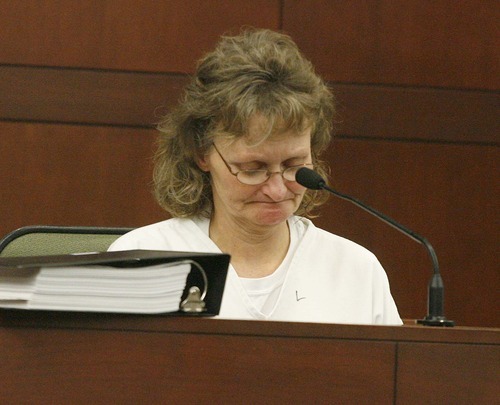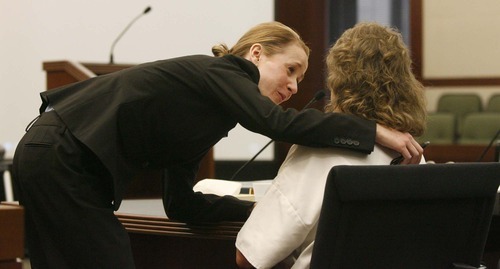This is an archived article that was published on sltrib.com in 2011, and information in the article may be outdated. It is provided only for personal research purposes and may not be reprinted.
Ogden • Lael Brown never showed up to fix a tenant's plumbing on Nov. 6, 1993. He didn't answer calls that day either.
These were points prosecutors were sure to tell the jury when they asked the jurors to convict Debra Brown in 1995.
Debra Brown found her friend and employer dead, shot three times in the head, on the morning of Nov. 7, 1993. But after Lael Brown had caught her stealing from him, Debra Brown's lack of corroborated alibi and Lael Brown's conspicuous absence made the woman a prime suspect and, eventually, a convicted killer.
On Monday, however, friends of the slain Logan man testified in court they had seen him the day before he was found dead.
"There's no question [I saw him]," said Terry Carlsen, a friend of Lael Brown's, who said he sat three stools down from the man and his son at a local diner that night.
Debra Brown's attorneys hope the testimony could be a turning point in the 53-year-old woman's fight for exoneration under a new state law that allows inmates to challenge their convictions if new evidence is discovered.
Debra Brown was convicted in 1995 of killing 75-year-old Lael Brown, who is of no relation.
With the testimony that Lael Brown could have been alive during one of the only times Debra Brown did not have a corroborated alibi, attorney Alan Sullivan, told 2nd District Judge Michael DiRedaon Monday that she could not have been the killer.
But attorneys for the state who have fought to uphold the conviction disagreed.
"The testimony of these witnesses does not foreclose the possibility that Debra Brown was his killer," said assistant Attorney General Scott Reed. "It only calls into question the time of the killing."
Another man, Delwin Hall, testified that he also remembered seeing Lael Brown at the diner that day.
But after reading through the statements of several diner employees who said they either did not see Lael Brown that day or were unsure if they saw him, Reed questioned whether Hall's memory could have failed him over the past 17 years.
"At the time, I was quite sure it was on a Saturday that I saw him," Hall said. "Now I couldn't tell you for sure."
Lael Brown's son, Michael Brown, also testified Monday that he was not with his father at the diner the night before his body was found.
In Debra Brown's case, the burden to provide clear and convincing evidence of innocence lies with the convicted.
"We came here today in hopes of finding answers," Reed said. "But all we've got to walk away with are more questions."
After several days of hearings earlier this year, DiReda took the case under advisement and then asked to hear from more witnesses. Following Monday's testimony, DiReda said he was "making progress" on the case but was not prepared to enter a ruling.
Debra Brown's son, Ryan Buttars, said Monday's hearing was another step toward his mother's exoneration.
"We're all optimistic," he said. "But when you to talk to her about it, she says, 'I know I'm going to get out.' "





